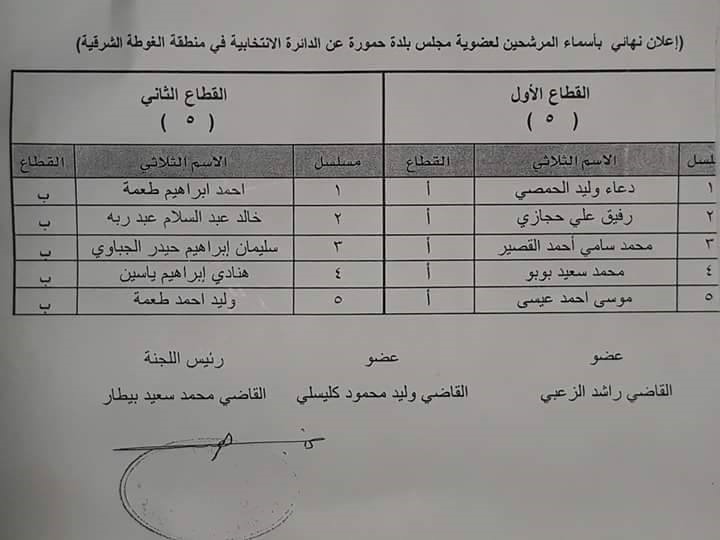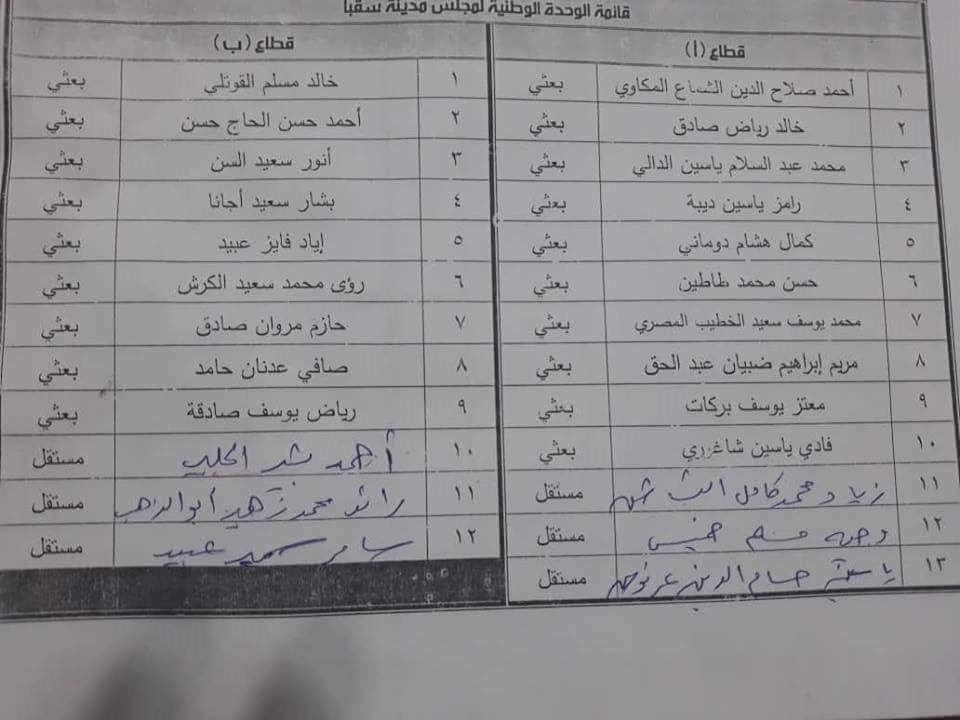Syrian government held local elections in its controlled parts of the country where Syrians voted for more than 40,000 candidates competed for 18,478 seats on local administrative councils in 88 constituencies included 6551 polling centers.[1]
It is the first local bolls since December 12, 2011, which conducted pursuant to Legislative Decree No.391 of 2011, which fixed the dates of local council elections.[2]
This was preceded by the issuance of several Legislative Decrees including Decree No. 101 which regulated the election of members of the People's Council and those of local councils on August 3, 2011[3] and Decree No. 107, “The Local Government Act”[4] on the decentralization of powers and responsibilities. On July 26, 2015, the government issued Decree No. 11 which provided for the amendment of section 1 from Article 55 of Act No. 107 to be " If the governor is exempted or legally absent the District Police Commander would be his designee in the executive branch and the vice-President of the Executive Office in all terms of reference relating to the work of the Office, and he decides the maintenance and orders the expenditures and payments.[5]"
The local council elections came after the Syrian regime and Russian allies’ control over most rebel enclaves including those in eastern Ghouta[6], Daraa province[7], Homs’ northern countryside and others.
According to many testimonies obtained by STJ, the Syrian government exercised pressure on civilians to vote for candidates from parties loyal to it, threatening those who refused by calling them “Syria’s enemies”.
Polls were also conducted in regime-held areas in Al-Hasakah, under the Kurdish Autonomous Administration, where the Syrian government forced employees in its institutions to vote for the National Unity list, which includes members of The National Progressive Front, loyal to the Syrian regime, by threatening them to cut their pay, and that naturally led the pro-government candidates to win the elections in a landslide.
According to STJ’s field researchers, the majority of those elected in each of eastern Ghouta, Daraa and Al-Hasakah, are members of the ruling Ba'ath party, and were already chosen by acclamation by pro-government officials, which made the polls a farce.
-
“Those who refuse to vote are enemies of Syria”
Earlier in September 2018, Syrian government agencies began announcing local council elections in eastern Ghouta, which was confirmed by "Hasan Sleek ", a media activist from Douma city:
"With the beginnings of 2013, the Syrian regime’s local councils were replaced by others of rebels, in the areas they had taken, which oversaw the functioning of the towns. However, after the opposition’s evacuation from those areas, the Syrian regime returned to appoint local councils as it used to do before 2011, by forcing civilians to vote for a list of their agents, mostly from the Ba’ath ruling Party. "

An election rally in Douma with the aftermath of a rocket appeared on the ground, which was fired earlier by regime forces.
Photo credit: Duma News.

Preparations for the elections in Douma.
Photo credit: Duma News.
Omar Zarei, another media activist[8] from Douma, told STJ that the recent elections held by Syrian government forces in Douma proceeded as planned, noting that the candidates were distributed on three electoral lists: Al-Wafa’a list (Sincerity list), Sawa Lilmahabba wa Elbina’a list (together to spread the love and construct) and the National Unity list, which includes (28) Ba’athist candidates and the people were forced to choose. Omar pointed out that the majority of candidates were earlier members of reconciliation committees which settled with the Syrian government, including; Yasser Adas, Mahrous al-Shghari, Badi'a Juma, Ayman Hadar, Mohammed al-Saour, Adnan Ma’abakah and Hamza Baghdadi ".

A list for the candidates who win the elections in Douma.
Photo credit: Duma News.
Zarei added that candidates loyal to the Syrian regime sought to seize all the seats in Douma’s local council:
"I learned from some of the activists in Douma that during the electoral process, a meeting of the elders, close to the Syrian regime, was organized, during which they elected Sawa Lilmahabba wa Elbina’a list, by acclamation, and forced Al-Wafa’a list to withdraw in favor of it.The regime’s checkpoints in Douma did not confiscate the IDs of people on that day, as they do every day since the government retook the city, in order to claim the high turnout of voters, who were actually forced on it by threats of being called Syria’s enemies.”
The same happened in Hamoryah where the regime seized all the seats in the local council, according to Omar Issa, alias:
"Most of the candidates known for their absolute loyalty to the regime, some even are informers for intelligence services and helped hand over many young men to the security branches, some of whom were still disappeared so far. No civilian dared to stand for these elections, which results announced on September 17, 2018 "

A list of the candidates won in Hamoryah.
Photo credit: activists from Hamoryah.
Pro-regime candidates, members of the ruling Ba’ath Party, also seized the seats in Saqba town, as STJ’s field researcher reported.

A list of the candidates won the seats in Saqba’s local council
Photo credit: activists from Saqba.
-
Forcing government employees in Al-Hasakah to vote for regime agents
The Syrian regime held bolls also in Al Hasakah, in the 15% territories under its control:
"About (2788) candidates, both independents and lists, vied for 1745 positions in the local administration in Al Hasakah. There were about 25 polling stations in Al-Hasakah City and 15 in Qamishli. Five days before the elections, we, the candidates, asked for stations in Al-Hasakah villages, but the Syrian government refused citing the Autonomous Administration’s control there, knowing that authorities and people there vowed to watch the process and protect the boxes, so (112) candidates withdrew from the elections before they began, (103) of whom were from Al-Hasakah and the 9 others from Qamishli city.”, according to a lawyer ran for elections.”
The lawyer added that on September 16, 2018, all the ballot boxes were put in the areas of the national Unity List candidates, which includes members of The National Progressive Front, and when the independent candidates asked for the boxes to be monitored until the voters' arrival, the Judicial Committee supervising these elections said “you can leave if you are not consent”. He noted that all employees were forced to vote for the National Unity list, which led to the independent candidates’ withdrawn, and the win of the National Unity list by acclamation.
Salma. h, a teacher from Al-Hasakah confirmed the forcing all the government institutions staffs to vote for the National Unity List:
"On September 13, 2018, me and all the school staff were informed to bring our electoral card on September 16, 2018, to vote in local ballots, or our pay will be docked otherwise and we would be questioned by the Legal Committee. On the election day, which was a holiday, all employees were forced to attend school where they took our vote cards and forced us to go out in a march cheering for the Syrian regime, then we were taken to one of the polling stations and forced to thumbprint the ballot paper, without knowing for whom we’ve voted.”
-
Pro forma elections in Al Moadamyeh and forgery in Daraa
local sources in Al Moadamyeh town, Damascus suburbs, reported that it was a pro forma holding of local elections by the Syrian government, as only members of the Ba’ath ruling Party were allowed to run for local administration, citing that Mohamed Ibrahim al-Wawi, who won a seat in the local council is known for his cooperation with the Syrian air intelligence.
Mooneer Okla, a candidate from Mhajjah town, Daraa province, a member of the pro-government National Progressive Front, said in a post on his Facebook account in September 2018 that the elections hold in Daraa were rigged, noting that some candidates won by fake votes, which he provided evidences of, to the competent judiciary to investigate the case but to no avail.

The Facebook post of Mooneer Okla.
Photo credit: Facebook.
[1] “Syrians Voting for their Local Councils”, Ministry of Local Administration and Environment, September 17, 2018; http://www.mola.gov.sy/mola/index.php/2018-04-19-13-25-40/item/6897-2018-09-17-11-48-45 (Last edit: October 24, 2018).
[2] “Decree No.391 of 2011, Fixing the dates of Local councils’ polls”, People's Council of Syria, October 5, 2011; http://www.parliament.gov.sy/arabic/index.php?node=5575&cat=4373 ;(Last edit: October 24, 2018).
[3] “Legislative Decree No. 101 of 2011, the General Elections Law”, People's Council of Syria, August 3, 2011; http://www.parliament.gov.sy/arabic/index.php?node=5516&cat=4397 , (Last edit: October 24, 2018).
[4] “Legislative Decree No. 107, The Local Government Act”, People's Council of Syria, August 23, 2011; http://www.parliament.gov.sy/arabic/index.php?node=5575&cat=4390 ,(Last edit: October 24, 2018).
[5] “Legislative Decree No. 107 of 2015, amendment of The Local Government Act”, Syrian Council of Ministers, July 26, 2015; http://pministry.gov.sy/contents/12329/%D8%A7%D9%84%D9%82%D8%A7%D9%86%D9%88%D9%86-%D8%B1%D9%82%D9%85-/11/-%D9%84%D8%B9%D8%A7%D9%85-2015-%D8%A7%D9%84%D9%85%D8%AA%D8%B6%D9%85%D9%86-%D8%AA%D8%B9%D8%AF%D9%8A%D9%84-%D8%A7%D9%84%D9%85%D8%B1%D8%B3%D9%88%D9%85–%D8%A7%D9%84%D8%AA%D8%B4%D8%B1%D9%8A%D8%B9%D9%8A-107-%D9%84%D8%B9%D8%A7%D9%85-2011—-%D9%82%D8%A7%D9%86%D9%88%D9%86-%D8%A7%D9%84%D8%A5%D8%AF%D8%A7%D8%B1%D8%A9-%D8%A7%D9%84%D9%85%D8%AD%D9%84%D9%8A%D8%A9—. (Last edit: October 24, 2018).
[6] Retook by the Syrian regime during April 2018.
[7] Retook by the Syrian regime in late July 2018.
[8] Displaced recently to northern Syria.

